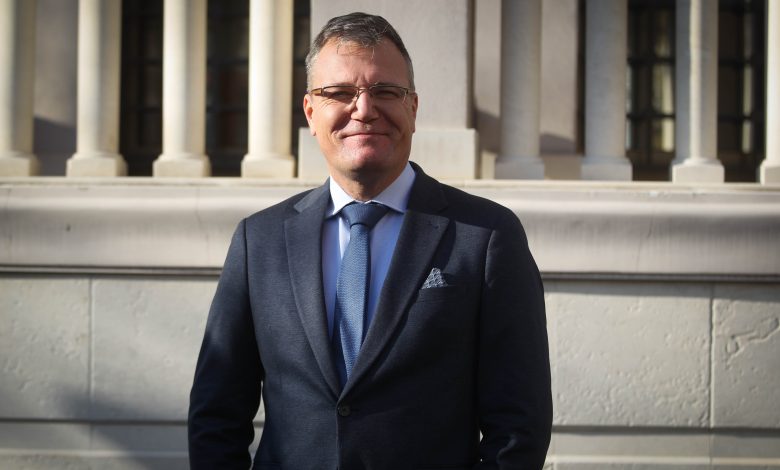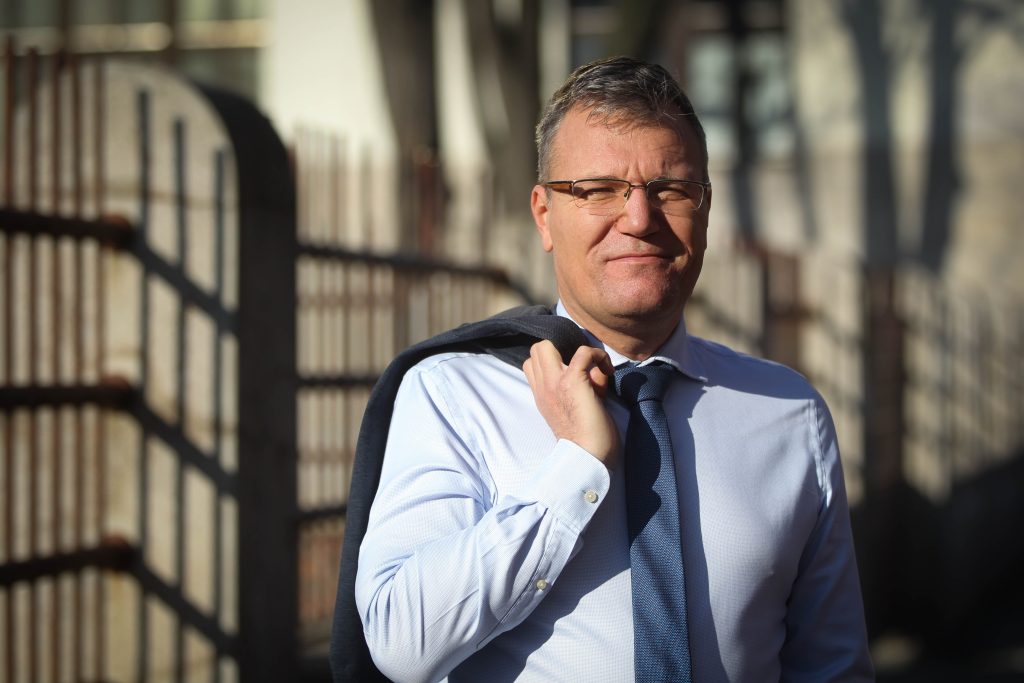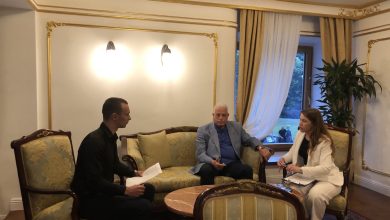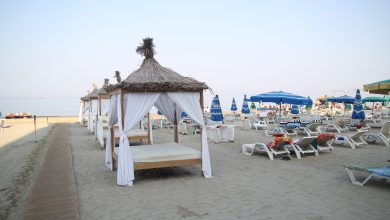Serbia’s path to EU could also lead via Ljubljana

Belgrade, April 12th, 2023 – The Ambassador of the Republic of Slovenia to Serbia, H.E. Damjan Bergant, stated in an interview with the Balkan Travel portal that Serbia’s membership in the EU is inevitable and that Slovenia is ready to assist Serbia on that path. The diplomat, who speaks Serbian fluently because he learned it in school during the former Yugoslavia period and served military service in Belgrade, where he currently serves, emphasized that our two countries are natural allies.
In the interview with Balkan Travel, the Slovenian Ambassador touched on his experience working in international organizations and compared the cities of Vienna, Strasbourg, and Ljubljana to Belgrade, which, in his opinion, has a special charm, and he feels at home in it. He has already visited almost all of the most attractive tourist destinations in Serbia and shared his impressions of them with us.
The Serbian language is not a problem for him – he understands, speaks, and writes it, unfortunately not in Cyrillic.
In the fifth grade of elementary school in the former Yugoslavia, we in Slovenia also learned the then-Serbo-Croatian language. It was only during one school year. Enough to understand and be able to watch TV shows or movies in a foreign language, of course, with Slovenian subtitles. I also belong to the generation that served in the army in the former Yugoslavia, and by chance, I served in the army in Belgrade. Of course, a year-long stay in this environment helped me to learn the language even better. Later, I occasionally used the language in my diplomatic work, and during the last three years of my life here in Serbia, I think I have improved it. Of course, knowing the language has helped me to integrate more easily and quickly into the environment – explains the Slovenian Ambassador.
During last year’s visit to Belgrade by the President of Slovenia, Borut Pahor, President Vucic stated that our trade exchange will even exceed two billion euros, which is an exceptional success that speaks of the friendship between the two countries. What, in your opinion, has influenced our countries to remain in such good relations since the breakup of the former Yugoslavia until today?
First of all, the fact is that Slovenia and Serbia have never been hostile countries. Perhaps after the breakup of the former joint state, some individuals had a negative opinion of Slovenia, attributing blame for the breakup of the country, which is, of course, not true, but otherwise, relations between the two countries, and especially between people, have always been at a very friendly and high level. The Slovenes know Serbia and like to do business here. I believe that two billion is not the final result and that the economic cooperation between our countries will only strengthen.
Where do you see the greatest potential for cooperation?
Slovenia and Serbia could become very close allies in the future as EU members. However, a prerequisite for this is for Serbia to complete its homework in the areas of the rule of law, democracy, media freedom, anti-corruption, neighborly relations, and as a result, become an EU member. Allies are always important in the EU and elsewhere. Serbia and Slovenia could become this, but only on the condition of working together, without envy or prejudice. Unfortunately, some individuals often experience a sense of superiority. At least, I feel it more from the Serbian side since I live here, but I’m sure it’s the same for individuals on our side. The reasons for Serbia may be due to differences in population and the size of the country or the historical significance of Serbia in the past, and for Slovenia, it may be due to economic and general development. Among equally valuable partners with similar interests, this can be avoided.
In one interview, you stated that it is not a matter of whether Serbia will join the European Union but when. What does Serbia need to do to achieve that goal?
I still believe that Serbia will be a part of the EU in the future. When – it depends primarily on Serbian politics and citizens of Serbia. It is not true that we in the EU do not want Serbia in the Union. Quite the opposite. Serbia must become a part of the EU because it is geographically located in Europe and is, in fact, bordering EU countries. The entire Western Balkans is an island that naturally belongs to the EU. But EU membership also requires a lot of hard work and sacrifices in some areas. Serbia, and especially you Serbs, must first understand that you are a part of Europe and the world and that there are no enemies or malicious people who want to harm Serbia and Serbs in your immediate vicinity. Of course, tradition, history, national belonging, and everything else are important, but individuals and the global perspective of Europe are even more important. There is nothing wrong with someone being a Serb and living outside of Serbia, but they are first and foremost an individual who is a European and belongs to a wider community, Europe. The EU offers the greatest possible perspective in the rule of law, human rights, and democracy. That is why it is necessary to achieve as many of these values as possible and not to fight against them. No country is perfect in these values, but they need to get closer to them. Nationalism is the biggest enemy of the EU, and I am afraid that individuals in Serbia are currently more inclined towards nationalism than the European perspective. Therefore, this mental leap will also be necessary for everyone to understand what Europe means and what advantages it brings. Closing oneself off has never been better compared to a broad and open view. This is the foundation that Serbia must understand and accept.
Does Serbia have Slovenia’s support on this path, and does Slovenia have a specific initiative planned to help Serbia become a new member as soon as possible?
Slovenia constantly repeats that it is ready to help Serbia on the path to the EU, wherever possible and there is a desire to do so. I always emphasize that Slovenia is a natural ally of Serbia on the road to the EU. In fact, I can say that the road from Belgrade to Brussels can lead via Ljubljana. But how much Serbia wants to take advantage of that depends mainly on Serbia.
What are you most proud of in your previous term regarding bringing our two countries closer together?
I am very proud of the exceptionally good relations between the two countries in the political, economic, cultural, and other fields. In fact, there are no open issues between the two countries, except for the question of succession, which is not a bilateral but a multilateral issue, involving Croatia, Bosnia and Herzegovina, and North Macedonia. The economy between the two countries is strengthening, and political contacts at the highest and lowest levels are strong.
According to your education – you graduated in International Relations and worked in Vienna and Strasbourg, at the OSCE and the Council of Europe. What sets Belgrade apart from those cities?
It’s difficult to compare cities with each other. I can compare all the mentioned cities with Ljubljana. Each city has its own character, depending on various factors, including its people. In any case, Vienna is an exceptionally beautiful city, very similar to Ljubljana in character, especially in culture, architecture, way of life and living standards. Generally, it’s a great place to stay. Strasbourg is similar in size to Ljubljana, but it’s not the capital city of the country, so it has a somewhat provincial feel. It’s interesting, but it takes some getting used to its way of life if you live there. Belgrade has a special charm. It’s a very relaxed city, which cannot be compared to Ljubljana or Vienna, let alone Strasbourg. I feel extremely comfortable in Belgrade, primarily because of the kindness of people, and at the same time, Belgrade offers everything that a capital city can offer. The only thing that bothers me in Belgrade compared to the mentioned cities is the traffic and air pollution. But this is more of a recommendation that I would personally suggest to the authorities as a priority to solve.
How many Slovenians visit our country annually?
A large number of Slovenians come to Serbia throughout the year. It’s an extremely popular destination, mostly because of entertainment and food. Slovenians like to relax, and it’s obviously easier here than in Slovenia, which is a bit more “tight” than Serbia. Many people also have personal connections to Serbia. They either have roots here, or they have connections from the time of living in a common country. But young people also like to go to Belgrade and Novi Sad. I hear that a large number of Slovenians ski on Kopaonik in the winter, and I myself have met Slovenian tourists during trips to various parts of Serbia. Some of them also contact us at the embassy, especially when they need help due to theft or loss of documents.
What have you visited in Serbia and what left the biggest impression on you?
I have visited almost all of the most attractive tourist places in Serbia. I still need to visit Stara Planina and Kamena Gora. I have traveled almost all of Vojvodina, visited national parks Đerdap and Kopaonik, Đavolja Varoš, Zlatibor, Tara, Drvengrad, Uvac, Sandžak, etc. I enjoyed the places where natural beauty was most prominent. The strongest impression on me was made by Uvac, the fortresses of Golubac and Ram, Tara with a view of the Drina Valley, the ride on the Šargan Eight, beautiful forests and vineyards on Fruška Gora.

When you compare the lifestyle habits of people in Slovenia and Serbia, what are the similarities and differences?
Slovenians and Serbians are quite different. Serbians are a more open, warm, and helpful nation. I won’t say that Slovenians are not sociable and hospitable, but not to the same extent as Serbians. On the other hand, Serbians get annoyed and emotionally react more quickly to certain things that do not meet their standards. This can be seen in everyday life, especially when we observe politics and international events, as well as traffic. Serbians are generally too concerned and tend to compare themselves too much with other nations, mostly due to the media and politics. Sometimes, this can be a good thing, but it can also be harmful because people later become disappointed because of these comparisons. Especially because there is competition in everything and the impression that they are losing. We, Slovenians, are also somewhat reserved about this issue and do not bother so much. Certainly, we are in a completely different situation because we are part of the European family due to our membership in the EU. I notice that in Serbia, there are too many extremes. There is no middle ground, which is often the best.
According to the data from the Slovenian Tourist Organization from 2022, Serbian tourists rank 11th in terms of the number of overnight stays in Slovenia, and the destinations they visit the most are Ljubljana, Maribor, and Piran. Do you expect that number to increase this year?
Of course. The number of tourists is again on the rise after the Covid pandemic, and it is realistic to expect an increase in the number of Serbian visitors to Slovenia as a result. I think that lately, Serbians have been visiting Slovenian ski resorts quite a bit. Skiing has become a pretty popular recreational sport, and given the crowds on Kopaonik, many people are opting for skiing in Austria, Italy, and Slovenia.
What does Slovenia have on offer for 2023?
Slovenia is always an interesting tourist destination for those who know it because, in addition to the sea and nature, it also offers enormous possibilities for medical and thermal tourism. Moreover, it is recognizable in foreign media that deal with tourism as an exceptional destination, especially its nature. National Geographic has recently included Slovenia, along with the Azores and Scotland, on the list of the most popular destinations that offer exceptional nature. In short, I am afraid, both in a positive and negative sense, that Slovenia will gradually become a big tourist attraction for many tourists and travelers from all over the world.
As a Slovenian, what do you recommend for Serbian tourists to see? What is a place that is not so well known but important to see?
I don’t think it’s necessary to single out Bled, Bohinj, the Slovenian coast, Slovenian mountains, vineyards in Brda and Styria, and spas because Serbians already know all of that well. But Slovenia also has some exceptional places that require a bit of an adventurer’s spirit. For example, the forests in the southeast of Slovenia or the Mlinarica canyon in the Soča Valley, not to mention the beauty of Ljubljana Marshes. I certainly recommend the mountain transversal, which starts in Maribor and ends in Ankaran.
Slovenia is known as a country of health due to the large number of spas and thermal centers. Have you visited any spas in Serbia and what are your impressions?
I’m not a big fan of spas and pools, I usually prefer nature. But since spas are usually located where nature is, I had the opportunity to visit Vrdnik and Fruška Gora spas. I didn’t stay there or swim in the pools, but I was happy to see the infrastructure, which has very good foundations. Perhaps the surroundings could use a little sprucing up and the offer for tourists could be adjusted, but these places are at a high level.
Author: Vasilije Filipović

